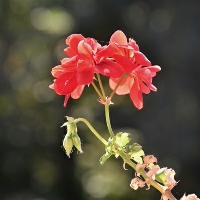"In the Three Qudao" is a seven character quatrain written by Zeng Ji, a poet of the Southern Song Dynasty.
The first sentence of this poem is about travel time, the second sentence is about travel route, the third sentence is about the beautiful scene of Lvyin, which is still rich when climbing the mountain, and the fourth sentence is about the sound of yellow warblers. A few more pleasant songs of yellow warblers are added to the roadside green forest, which adds infinite vitality and interest to the road of Sanqu Mountain.
The whole poem is bright and natural, full of life charm.
1. The content of the ancient poem "In the Three Quds Road": When the plum is yellow, it is sunny day by day, and the brook is full but the mountain is full.
2. When the green shade does not decrease, the road adds four or five orioles.
3. Word and sentence interpretation:
① On the way to Sanquzhou.
4. Three Qus are Quzhou. Today, Changshan County, Zhejiang Province, gets its name because of the Three Qus Mountain.
5. ② Plum yellow: May is the season when plums are ripe.
6. ③ The stream overflows: take a boat to the end of the stream.
10. ④ Walk on the mountain: walk on the mountain path again.
14. ⑥ No reduction: not much less, almost.
15. ⑦ Oriole (l í): Oriole.
16. The implication of the ancient poems in Sanqu Road The author wrote an ordinary journey in an orderly way, which not only wrote the pleasant scenery in early summer, but also gave a vivid impression of the pleasure of the poet, giving people a sense of peace.
17. The poem compares the rainy yellow plum days of previous years with the sunny days at present; The contrast between the future green trees and the tranquility of the mountain forest and the call of the green trees and the yellow warblers in front of us creates ups and downs, which leads to new ideas.
18. The whole poem also uses the language of scenery, which is completely natural and depicts the beautiful scenery in the mountainous areas of western Zhejiang in early summer.
19. Although I didn't describe my feelings, I was happy and happy in the description of the scenery.

